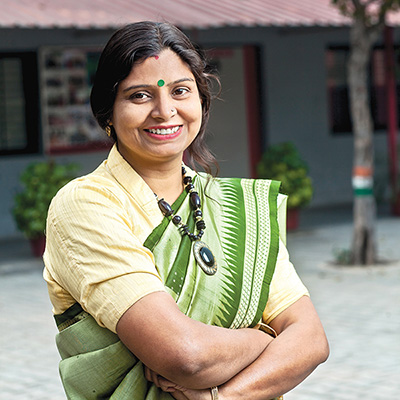THE ACTOR AND THE DIRECTOR
“After a couple of sessions, I began to appreciate the theatrics of my students. This was because I could now put it to use”

Ms. Babita Bhardwaj
A teacher supported at our Shikshaantar program in Delhi (ITEI-Dilshad Garden)
“Sometimes, as a teacher, you have to pretend to be annoyed even at something that is rather funny. Because you are cautious to teach what is right and wrong for them. You want them to start behaving in a certain way,” reasons Babita Bhardwaj during a session at ITEI-Dilshad Garden when asked to cite an incident where theatre has helped her be a better teacher.
Theatre often helps us present a particular facet of our personality to a specific set of people. As a teacher, the facet one presents is an example one sets for their students. It is almost disdainful, then, to not use theatre as a strategic tool to understand and develop behaviours.
“Most people do not know how to communicate. However, simple strategies can not only avoid problems but also undo the damage,” explains Babita. Young children are often blamed for being very dramatic. This accusation often disregards the hidden talent and intent behind each performance. “After a couple of sessions, I began to appreciate the theatrics of my students. This was because I could now put it to use,” exclaims she!
Especially in the absence of material resources; using students’ experiences and imagination, as resources area beautiful addition to any classroom.
“The impeccable language skills of my students delight me the most! They have become more confident and engaging speakers,” she says.
Theatre has been a tool for communication for as long as time can tell. A man has many faces. Life, however, seems to lack a script! By learning the skills of improvisation, man can not only perform his roles better but also become better at adapting to changes.
Babita Bhardwaj’s classroom is a proof, that with the right training, the abilities of any student and teacher can be enhanced!
